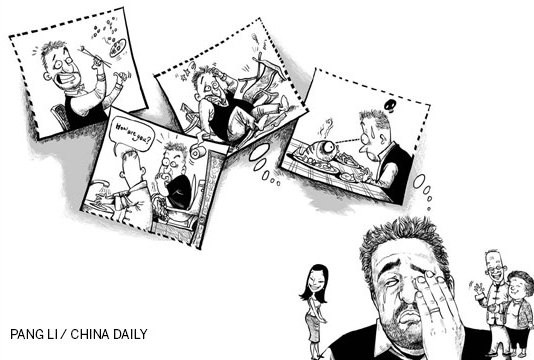Mixed joy club
Updated: 2012-11-10 08:08
By Raymond Zhou (China Daily)
|
||||||||

A funny review of the unhappy fallouts from a transnational marriage is long on laughs, but short on the fundamentals that make or break such a family.
A Sina Weibo user who calls himself "Brother Cui in North America" wrote an assessment of foreigners marrying Chinese women. It spreads like wildfire partly because of its self-deprecating humor, which is not exactly a Chinese characteristic.
Cui, verified by Sina as a Peking University graduate currently based in the US, seems to have set his eyes on a career similar to Joe Wong, the Chinese engineer who made his name with his Stateside standup comedy routines. So, Cui's much reposted treatise on the hidden repercussions of transnational marriages should probably not be taken at face value. But like all humor or satire, it contains a kernel of truth - or in this case, a moment of epiphany to most Chinese.
Cui's first word of caution to those interested in having a Chinese wife: "Once you marry a Chinese woman, you're marrying her whole family. In half a year, her mom and dad, her second elder sister and her children, will line up to come to America. A hundred years ago, first there was one Chinese worker who went to San Francisco to build a railroad, and now, lo and behold, California has a million Chinese. Which country in the future dares to invite Chinese to build their railroads?"
If an American politician had used this tone, the Chinese-American community would have jumped up in protest. In the US, ethnic humor is the territory of ethnic-minority comedians. Cui must have counted himself as one. But his jokes are actually designed for Chinese consumption, and as such, they display more accuracy and objectivity than previous descriptions of such marriages, which went to one of two extremes, either friction-free bliss or doomed failure.
Cui went on with his litany of backlashes, which include the dazzling array of Chinese kitchenware and Chinese sauces in an otherwise American home. OK, this sounds like a not-so-subtle approbation of the Chinese culinary art. But there is a definite downside, and that is the painful loss of privacy with the cohabiting in-laws. Your father-in-law may burst into the toilet you're using and he may nonchalantly wash his hands and practice English with you, never finding it awkward, describes Cui.

In Hollywood movies, the visit by an in-law is portrayed as a mini-apocalypse. So, if you get a Chinese spouse, you're probably psychologically set for such a prospect - not just a brief visit, but an extended stay by your parents-in-law.
The language barrier is the most formidable one. Other than that, in my opinion, it is more a generational gap, with many of the quirks recited by Cui commonplace even inside China. For example, old folks tend to be frugal and turn off the lights as they leave a room; they tend to see things like the carpet as a luxury item and insist on covering it up with a plastic sheet to prevent it from wear and tear.
Young couples in urban China run into similar situations when their parents come to live with them. My father compiled a list of my "sins" after living with me and my family for a month, including dining out and ordering bottled water. For someone who had tasted hunger, penny-pinching is not only a virtue but a necessity.
Cui's article on East-West conjugal union touches on certain cultural differences, but at their core they may not be country-specific. When two people decide to form a family, they will naturally bring their differences with them. In China, the urban-rural gap can rear its ugly head in a marriage. The so-called "phoenix man" is someone raised in the countryside but who broke into the much higher society of urban China through education and hard work. As he marries a city girl, a "peacock woman" who has never been through hardship but has a tendency to show off wealth, their outward compatibility may soon be run over by lifestyle differences instigated by economic disparity in their background.
Surely, a transnational marriage between a Chinese woman and, say, an American man can provide plenty of fodder for cultural comedy. A dinner-table scene in the movie Joy Luck Club has such gags galore. A Chinese parent said her cooking is not good or the dish not salty, but the American son-in-law did not know it was typical Chinese modesty and took it literally.
The joke can also be on the Chinese side as the American eats everything on his plate as a sign of liking the food or just being nice and, as a result, gets endless restocking.
The biggest stereotype about East-West wedlock could well be the Madam Butterfly myth: Because Asian women tend to be small in build, even petite, they are thought to embody the quality of submissiveness and extreme loyalty, as shown in the opera Madama Butterfly. In reality, women who marry outside their clan, so to speak, are usually those with an adventurous streak, a strong will and a special willingness and capability to adapt to new environments, assuming they are to relocate to their husbands' land, not the other way around.
While touching on the raw emotional nerves, the Butterfly story, supposedly taking place in late 19th century, is simplistic in its portrayal of the title character. Cio-Cio San, though a teenager, is a geisha who should be familiar with the worldly affairs. The tenacity with which she breaks with her roots and plunges into what she believes is true love is tinged with a psychosis. You may say people so deeply mired in love can be delusional, but it's not just an Asian thing. Sometimes, love does not triumph over such mundane things as culinary habits or the difference of using a toothpaste - with the woman neatly squeezing from the lower tip and the man doing it haphazardly.
If a man, from whichever country, goes around in search of "Butterflies" to be rescued, believing poverty induces obedience, he is in for a shock. Women from disenfranchised places or social status may have the vulnerable facade, but their tough life has given them strength often belied by their appearance. Cui's depiction of them as "control freaks", though hyperbolic, is not completely groundless.
Of course, like all stereotypes, those surrounding mixed matrimonies may have sprung from some true stories, but grew incurably simplistic, shorn of the complexities of human interaction. Even two people with identical backgrounds and personality may run into conflict when they live together as a couple for a sustained period of time. In a day and age when interracial or transnational marriages no longer make headlines, whatever virtue or vice exhibited by one person is not automatically assigned to so-called "national traits".
To borrow from Leo Tolstoy, whose three lead characters in Anna Karenina do not transcend national or social limits, happy families are all alike, and every unhappy family is unhappy in its own way. When soy sauce or tomato sauce is the cause of a family's downfall, it bespeaks a much deeper rift that may not be repaired with gastronomy.
Contact the writer at raymondzhou@chinadaily.com.cn.
(China Daily 11/10/2012 page11)











